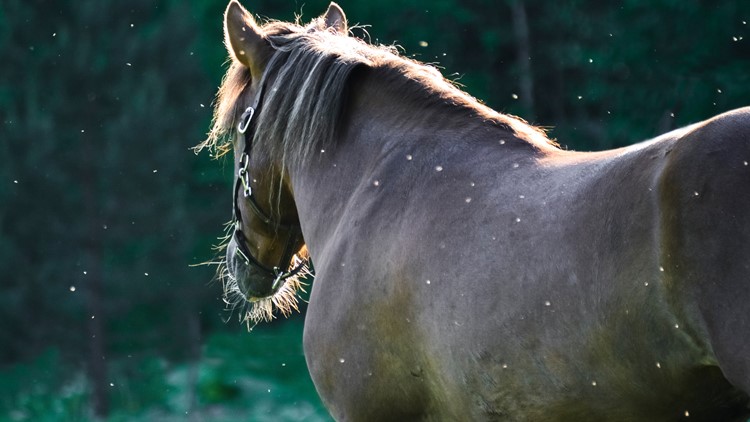BARRY COUNTY, Mich. — A Barry County horse has died after contracting Eastern Equine Encephalitis (EEE), a deadly mosquito-borne virus.
A statement from the Barry-Eaton District Health Department said the horse became ill on Aug. 26; it was the first confirmed animal case of EEE in Barry County this year.
There are 13 confirmed cases of EEE in horses in five Michigan counties, including Barry, Clare, Kent, Montcalm and Newaygo.
Health officials are warning people to who live or visit those counties to take precautions against mosquito bites.
Michigan experienced its largest outbreak of EEE in 2019, in which ten residents were infected--six of whom died from the infection. The most severe cases can cause the brain to swell, and symptoms can include fever, weakness and muscle and joint pain.
To protect yourself and your family, here’s what the health department provided:
- Avoiding being outdoors from dusk to dawn when mosquitos that carry the EEE virus are most active.
- Applying insect repellents that contain the active ingredient DEET, or other U.S. Environmental Protection Agency-registered product to exposed skin or clothing, and always follow the manufacturer’s directions for use.
- Wearing long-sleeved shirts and long pants when outdoors. Apply insect repellent to clothing to help prevent bites.
- Maintaining window and door screening to help keep mosquitoes outside.
- Emptying water from mosquito breeding sites around the home, such as buckets, unused kiddie pools, old tires or similar sites where mosquitoes may lay eggs.
- Using nets and/or fans over outdoor eating areas.
What is EEE?
EEE is a viral disease, transmitted by mosquitoes to both animals and people. EEE is one of the most dangerous mosquito-borne diseases in the U.S., and the virus is typically seen in late summer to early fall each year in Michigan. While horses are highly affected by the disease, people can also be infected with EEE from the bite of a mosquito carrying the virus.
Signs of EEE in humans
In humans, signs of EEE include the sudden onset of fever, chills, and body and joint aches. EEE infection can develop into severe encephalitis, resulting in headache, disorientation, tremors, seizures and paralysis. Permanent brain damage, coma and death may also occur in some cases.
To protect your horses and other domestic animals (such as dogs, sheep and goats), the department recommends:
- Talking to a veterinarian about vaccinating horses against EEE.
- Placing livestock in a barn under fans (as mosquitoes are not strong flyers) during peak mosquito activity from dusk to dawn.
- Using an insect repellent on an animal that is approved for the species.
- Eliminating standing water on the property—i.e., fill in puddles, repair eaves, and change the water in buckets and bowls at least once a day.
- Contacting a veterinarian if an animal shows signs of the illness: fever and stumbling, which can progress to being down and struggling to stand.
RELATED VIDEO:
►Make it easy to keep up to date with more stories like this. Download the 13 ON YOUR SIDE app now.
Have a news tip? Email news@13onyourside.com, visit our Facebook page or Twitter. Subscribe to our YouTube channel.




